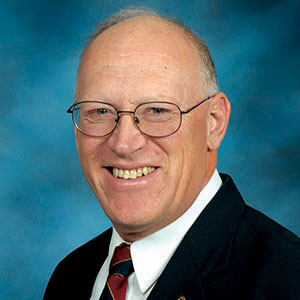
Matthew James | Download this photo
Kansas Profile – Now That’s Rural: Matthew James, remote worker
Oct. 20, 2021
By Ron Wilson, director of the Huck Boyd National Institute for Rural Development at Kansas State University
How long is your commute to work? Ten minutes? Twenty? Half an hour? I remember living in a city back east where it took more than an hour in stop-and-go traffic to get to work.
Today we’ll meet a young man whose commute lasts however long it takes for him to get to his computer in his house. He is part of the current wave of remote workers, and he is choosing to live in rural Kansas.
Matthew James is this young remote worker. He is a native of Concordia who went on to study computer science at K-State. “I was always interested in technology,” Matthew said.
In the summer after his freshman year, someone at Matthew’s church told him about an opportunity to work remotely. The county economic development director at the time was the wife of Matt’s high school baseball coach, so Matt was comfortable talking to her.
“She told me about a program in northwest Kansas called Rural & Remote,” Matthew said. She put Matthew in contact with Kade Wilcox and he got Matthew into the program.
Rural & Remote is one of the projects initiated by the Northwest Kansas Economic Innovation Center Inc., supported by the Dane G. Hansen Foundation in the northwest part of the state. The program is customized to fit each individual based on their experience and unique needs. It involves application, training, work experience and job placement support.
Matthew participated in the Rural & Remote Coding Academy, which trains people for work as web developers or software engineers. Coding is essentially the process of creating the electronic operating instructions for modern digital devices.
“With the way technology and society are changing, coders are becoming a bigger need,” Matthew said. “And since Covid, remote work has picked up.”
Matthew put in a 500-hour apprenticeship that turned into a full-time coding job by the time he finished college. After graduating, he moved back to Concordia. In fall 2021, he married his high school sweetheart, who had graduated from K-State as well.
Today, Matthew is a web developer who is working remotely for a digital solutions company headquartered in Lubbock, Texas. “We create solutions for businesses looking to grow,” he said. The company offers custom software, search engine optimization, websites, help with digital marketing and more. As projects are identified, Matt can accomplish them remotely.
“I have a sprint – that’s what we call a week’s worth of work,” he said. “It’s all custom, everything from helping an agribusiness company market seed, to creating a database of residential apartments for a management company.”
What does Matthew value about remote work? “I can set my own hours,” he said. “I usually work 8 to 5, but if I need to take time off to go to a doctor or dentist appointment, I can do that and make up the hours later.”
“There’s a bunch of guys I play noon basketball with at Cloud County Community College, so I like to go do that,” he said. His new bride is student-teaching nearby.
Matthew is thankful for the remote work opportunity. “It got me back to my hometown,” he said. “My family and friends are here and my wife’s family is nearby. I’m glad to be able to work in my field and do it from home. And this can be done in other fields too.”
“This is a win-win situation for businesses and employees. Both are seeing benefits,” Matthew said. “People like having the flexibility and companies save a lot on expenses by not having to pay for buildings.”
It’s great to see that remote work has made it possible for this young man to return to his hometown, the rural community of Concordia, population 5,111 people. Now, that’s rural.
How long is your commute? For Matthew James, his commute to work consists of a keystroke on his computer. We commend him for making a difference with his online entrepreneurship and his commitment to his community. I hope his computer never runs into a traffic jam.
Audio and text files of Kansas Profiles are available at http://www.kansasprofile.com. For more information about the Huck Boyd Institute, interested persons can visit http://www.huckboydinstitute.org.
***
The mission of the Huck Boyd National Institute for Rural Development is to enhance rural development by helping rural people help themselves. The Kansas Profile radio series and columns are produced with assistance from the K-State Research and Extension Department of Communications News Media Services unit. A photo of Ron Wilson is available at http://www.ksre.ksu.edu/news/sty/RonWilson.htm. Audio and text files of Kansas Profiles are available at http://www.kansasprofile.com. For more information about the Huck Boyd Institute, interested persons can visit http://www.huckboydinstitute.org.


